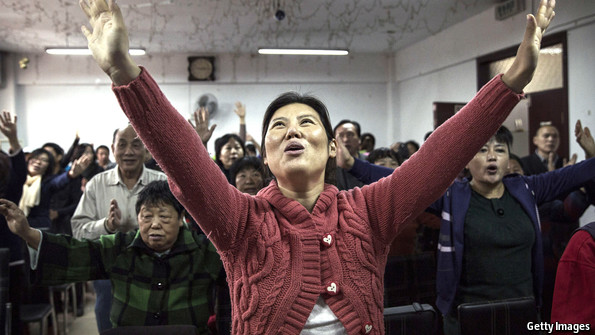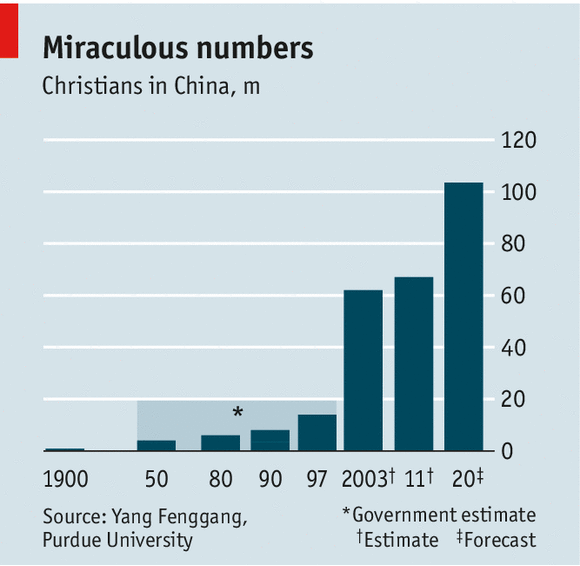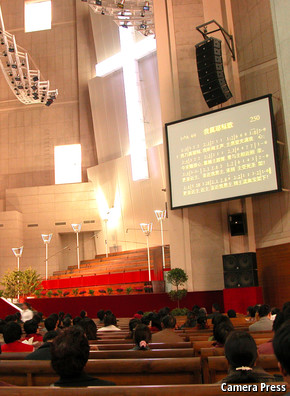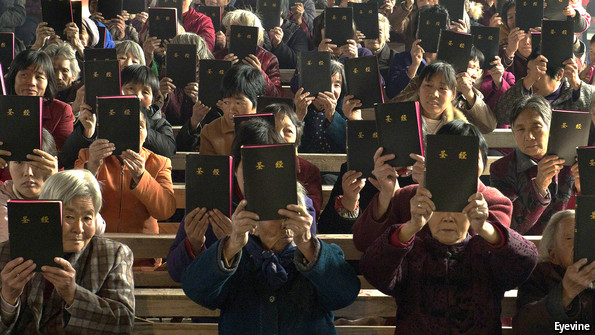Religion in China
Cracks in the atheist edifice
The rapid spread of Christianity is forcing an official rethink on religion

This year, however, more than 230 have been classed as “illegal structures” and removed. Videos posted on the internet show crowds of parishioners trying to form a human shield around their churches. Dozens have been injured. Other films show weeping believers defiantly singing hymns as huge red crosses are hoisted off the buildings. In April one of Wenzhou’s largest churches was completely demolished. Officials are untroubled by the clash between the city’s famously freewheeling capitalism and the Communist Party’s ideology, yet still see religion and its symbols as affronts to the party’s atheism.
Christians in China have long suffered persecutiont. Under Mao Zedong, freedom of belief was enshrined in the new Communist constitution (largely to accommodate Muslims and Tibetan Buddhists in the west of the country). Yet perhaps as many as half a million Christians were harried to death, and tens of thousands more were sent to labour camps. Since the death of Mao in 1976, the party has slowly allowed more religious freedom. Most of the churches in Wenzhou are so-called “Three Self” churches, of which there are about 57,000 round the country. These, in the official jargon, are self-supporting, self-governed and self-propagating (therefore closed to foreign influence). They profess loyalty to China, and are registered with the government. But many of those in Wenzhou had obviously incurred official displeasure all the same; and most of the Christians who survived Maoist persecution, along with many new believers, refuse to join such churches anyway, continuing to meet in unregistered “house churches”, which the party for a long time tried to suppress.
Christianity is hard to control in China, and getting harder all the time. It is spreading rapidly, and infiltrating the party’s own ranks. The line is blurring between house churches and official ones, and Christians are starting to emerge from hiding to play a more active part in society. The Communist Party has to find a new way to deal with all this. There is even talk that the party, the world’s largest explicitly atheist organisation, might follow its sister parties in Vietnam and Cuba and allow members to embrace a dogma other than—even higher than—that of Marx.
Any shift in official thinking on religion could have big ramifications for the way China handles a host of domestic challenges, from separatist unrest among Tibetan Buddhists and Muslim Uighurs in the country’s west to the growth of NGOs and “civil society”—grassroots organisations, often with a religious colouring, which the party treats with suspicion, but which are also spreading fast.
Safety in numbers
The upsurge in religion in China, especially among the ethnic Han who
make up more than 90% of the population, is a general one. From the
bullet trains that sweep across the Chinese countryside, passengers can
see new churches and temples springing up everywhere. Buddhism, much
longer established in China than Christianity, is surging too, as is
folk religion; many more Han are making pilgrimages to Buddhist shrines
in search of spiritual comfort. All this worries many officials, for
whom religion is not only Marx’s “opium of the people” but also, they
believe, a dangerous perverter of loyalty away from the party and the
state. Christianity, in particular, is associated with 19th-century
Western imperial encroachment; and thus the party’s treatment of
Christians offers a sharp insight into the way its attitudes are
changing.It is hard even to guess at the number of Christians in China. Official surveys seek to play down the figures, ignoring the large number who worship in house churches. By contrast, overseas Christian groups often inflate them. There were perhaps 3m Catholics and 1m Protestants when the party came to power in 1949. Officials now say there are between 23m and 40m, all told. In 2010 the Pew Research Centre, an American polling organisation, estimated there were 58m Protestants and 9m Catholics. Many experts, foreign and Chinese, now accept that there are probably more Christians than there are members of the 87m-strong Communist Party. Most are evangelical Protestants.
Predicting Christianity’s growth is even harder. Yang Fenggang of Purdue University, in Indiana, says the Christian church in China has grown by an average of 10% a year since 1980. He reckons that on current trends there will be 250m Christians by around 2030, making China’s Christian population the largest in the world. Mr Yang says this speed of growth is similar to that seen in fourth-century Rome just before the conversion of Constantine, which paved the way for Christianity to become the religion of his empire.

Some Chinese also discern in Christianity the roots of Western strength. They see it as the force behind the development of social justice, civil society and rule of law, all things they hope to see in China. Many new NGOs are run by Christians or Buddhists. There are growing numbers of Christian doctors and academics. More than 2,000 Christian schools are also dotted around China, many of them small and all, as yet, illegal.
One civil-rights activist says that, of the 50 most-senior civil-rights lawyers in China, probably half are Christians. Some of them have set up the Association of Human Rights Attorneys for Chinese Christians. Groups of well-paid urban Christian lawyers join together to defend Christians—and others—in court. Missionaries have begun to go out from China to the developing world.
Unexpected benefits
The authorities have responded to this in different ways. In places
like Wenzhou, they have cracked down. Implementation of religious policy
is often left to local officials. Some see toughness as a way of
displaying loyalty to the central leadership. Mr Yang of Purdue
University says there are rumours in Wenzhou that the crackdown there is
partly the result of a local leader’s efforts to win favour with
President Xi Jinping.China Aid, an American church group, says that last year more than 7,400 Christians suffered persecution in China. And there is still plenty of less visible discrimination. But 7,400 people are less than 0.01% of all Chinese Christians. Even if the figure is higher, in this century “persecution is clearly no longer the norm”, says Brent Fulton of ChinaSource, a Christian group in Hong Kong.
That is largely because many officials see advantages in Christianity’s growth. Some wealthy business folk in Wenzhou have become believers—they are dubbed “boss Christians”—and have built large churches in the city. One holds evening meetings at which businessmen and women explain “biblical” approaches to making money. Others form groups encouraging each other to do business honestly, pay taxes and help the poor. Rare is the official anywhere in China who would want to scare away investors from his area.
In other regions local leaders lend support, or turn a blind eye, because they find that Christians are good citizens. Their commitment to community welfare helps to reinforce precious stability. In some large cities the government itself is sponsoring the construction of new Three Self churches: Chongyi church, in Hangzhou, can seat 5,000 people. Three Self pastors are starting to talk to house-church leaders; conversely, house-church leaders (often correctly) no longer consider official churches to be full of party stooges.
 Room for 5,000
Room for 5,000
Increasingly, the party needs the help of religious believers. It is struggling to supply social services efficiently; Christian and Buddhist groups are willing, and able, to help. Since about 2003, religious groups in Hong Kong have received requests from mainland government officials to help set up NG O s and charities. In an age of hedonism and corruption, selfless activism has helped the churches’ reputation; not least, it has persuaded the regime that Christians are not out to overthrow it. For the Catholic church, though, the situation is trickier: allegiance to Rome is still seen by some officials as a sign of treachery.
Ms Wielander says she does not believe the flock will go on growing by 10% year in, year out. But she admits that the party is now paying more attention to the increasing religiosity of ordinary Chinese. So, in some areas, it is modifying its attitude and official rhetoric (while keeping intense pressure on Buddhist Tibetans and Muslim Uighurs, whose religious beliefs are seen to threaten the integrity of the state). In May last year the head of the Russian Orthodox church was welcomed by Mr Xi in Beijing, the first such foreign church leader to meet China’s party chief.
Now is the time for all good men...
When the Communist Party allowed entrepreneurs to join in 2001, some
voices suggested that it should also allow religious believers to do so.
Pan Yue, a reformist official, wrote a newspaper article to that effect
entitled, “The religious views of the Communist Party must keep up with
the times”. One influence was the decision of the Communist Party of
Vietnam in 1990 to allow its members to be religious believers. The move
went smoothly, and may even have helped to stabilise Vietnam after its
turbulent recent past. In China, however, Mr Pan’s idea was ignored.One Chinese article in 2004 claimed that 3m-4m party members had become Christians. Despite that, the party still has doubts about officially admitting them. Recent pro-democracy protests in Hong Kong are likely to reinforce those fears: some of the organisers were Christians. It worries the regime that the growth of house churches may also provide more room for the growth of quasi-Christian cults, which may then—like the banned Falun Gong movement—become politicised, and turn anti-Communist. The party’s fear of such cults is rooted in history. The Taiping rebellion in the mid-19th century, led by a man calling himself the brother of Jesus, resulted in more than 20m deaths.
But some officials are becoming more discerning in their crackdowns. This has been evident in Beijing where, around 2005, two large house churches began renting office space for their Sunday services. The largest, Shouwang church, was led by Jin Tianming, a graduate of Beijing’s elite Tsinghua University. It drew an intellectual crowd from the university district. On some Sundays up to 1,000 people attended services. Parishioners could download sermons from the church’s website. Mr Jin was known to be quietly arguing for more religious freedom. He tried to register Shouwang as a legal but independent congregation, not under the control of the official church, but was turned down. In 2009, just before a visit by America’s president, Barack Obama, the government forced the landlord of the building to terminate the church’s lease. Mr Jin took his congregation into a nearby park, where they worshipped in the snow. He and the church elders were placed under house arrest and many parishioners were detained. They had crossed a political red line.
It is a different story on the other side of Beijing. In an office building just off the third ring road another unregistered congregation, known as Zion church, meets in a similar venue; its pastor, Jin Mingri, is a graduate of Peking University. Like Shouwang, Zion covers an entire floor and includes a bookshop and a café offering loyalty cards to coffee-drinkers. The main hall holds 400 people. It looks and feels like a church in suburban America. Zion’s pastors preach equally uncompromising evangelical sermons, yet the church remains open because it is more cautious in how it engages with sensitive issues.
The pastors of both churches (and the leader of Shanghai’s largest house church, before it was closed, like Shouwang, in 2010) are members of China’s 2.3m-strong ethnic Korean minority, who see the Christianisation of South Korea as a model for China to follow. Both pastors came of age during—and took part in the Tiananmen protests of 1989, the crushing of which led to their disillusionment with the party and the spiritual search that led to their conversion. Yet officials in Beijing, so far, feel they can cohabit with one of them at least.
 Not the Little Red Book, but the Good Book
Not the Little Red Book, but the Good Book
Mr Liu, a Christian himself, is now, on his own initiative, drafting a document that he hopes will become the country’s first law on religion. At present religion is governed only by administrative regulations; such a law might make it more difficult for officials to crack down arbitrarily. Mr Liu says the party should allow its members to be believers, since an age of toleration would benefit the party as well as the churches. There should be a “religious free market”. But he admits that this, like a law, is a long way off.
Getting bolder
Meanwhile, acts of defiance are increasing. A mid-ranking official in
a big city was recently told that her Christian faith, which was well
known in the office, was not compatible with her party membership and
she would have to give it up. She politely told her superiors that she
would not be able to do that, and that her freedom of belief was
protected by the Chinese constitution. She was not fired, but sent on a
remedial course at a party school. She is now back at her job, and says
her colleagues often come to her asking for prayer.Christians are becoming more socially (and sometimes politically) engaged, too. Wang Yi is a former law professor and prolific blogger who became a Christian in 2005. The next year he was one of three house-church Christians who met President George W. Bush at the White House. Mr Wang is now pastor of Early Rain, a house church in the south-western city of Chengdu. On June 1st this year, International Children’s Day, he and members of his congregation were detained for distributing leaflets opposing China’s one-child policy and the forced abortions it leads to.
In 2013 a group of Chinese intellectuals convened a conference in Oxford which brought together, for the first time, thinkers from the New Left, whose members want to retain some of the egalitarian parts of Maoism; the New Confucians, who want to promote more of China’s traditional philosophical thinking; and the New Liberals, classic economic and political liberals. For the first time Christian intellectuals were included as well. The gathering produced a document, called the Oxford Consensus, emphasising that the centre of the Chinese nation is the people, not the state; that culture should be pluralistic; and that China must always behave peacefully towards others. This was not overtly Christian, but it was significant that Christian intellectuals had been included. A summary of the meeting was published in an influential Chinese newspaper, Southern People, and most participants continue to live freely, if cautiously, in China.
The paradox, as they all know, is that religious freedom, if it ever takes hold, might harm the Christian church in two ways. The church might become institutionalised, wealthy and hence corrupt, as happened in Rome in the high Middle Ages, and is already happening a little in the businessmen’s churches of Wenzhou. Alternatively the church, long strengthened by repression, may become a feebler part of society in a climate of toleration. As one Beijing house-church elder declared, with a nod to the erosion of Christian faith in western Europe: “If we get full religious freedom, then the church is finished.”
No comments:
Post a Comment